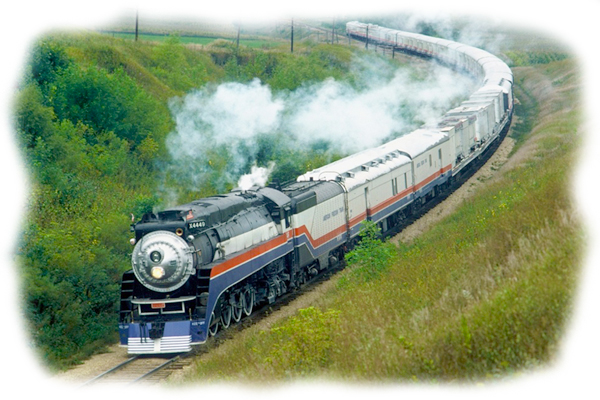
The
Story of the 1975 - 1976 AMERICAN FREEDOM TRAIN |
||
 |
||
It had been the most remarkable two centuries in human history. At no other time had so much happened so quickly: a nation founded upon revolution and wholly new principles had spanned a continent-sized frontier, and its people were individuals of mythic proportion who answered to no king that claimed to rule them by birthright. Instead, the people of the new Amerce Nation laid claim to their own birthright as free men. They set forth as trailblazers in canoes on unknown waters, then as woodsmen, settlers, gold seekers, buffalo hunters, cattlemen, farmers, and industrialists. In just 30 years, the Oregon Territory had created an undefined but continental nation of enormous size. In less than a hundred years after the Declaration of Independence, rails spanned from ocean to ocean, and cities rose from windswept prairies that would become the breadbasket of the world. Even as the ancient ways of Native inhabitants were lost - often savagely, and in contradiction with the American creed of individual rights and self-determination, America was building a beacon of hope for the tired, the poor, the huddled masses upon other shores who were yearning to breathe free. An industrial capacity would grow from American dreams and determination to create the capacity that would win two World Wars, halt conquerors bent on global domination, and spread the dream of freedom to the world. At mid point on the journey, America had paused for an exuberant celebration of the nation's 100th birthday, the Philadelphia Centennial Exposition of 1876. Incredibly, as its 200th birthday approached, it appeared the Centennial would have no Bicentennial counterpart. The Bicentennial, in the wake of Vietnam and the midst of Watergate, was about to pass with little note taken or any event to celebrate. Ross Rowland and several of his friends and associates from past steam-powered excursion trains worked against the trend. They knew that the steam locomotive was a proven "people magnet," and they recalled the phenomenal success of the exhibit cars included in the Golden Spike Centennial Limited in 1969, powered by Steamtown's ex-Nickle Plate 2-8-4 Berkshire steam engine #759. The result of their efforts was eleventh-hour corporate sponsorship of a second Freedom Train. By the time the five corporate sponsors signed on, there was barely time to build the train or to find or restore suitable steam locomotion. It almost didn't happen. Its legacy is a lesson in never quitting when things don't look promising but you know you have a worthwhile dream. The triumph of the steam-powered American Freedom Train was, indeed, the only nationwide celebration of the Bicentennial. It was pulled by steam locomotives in the age of the diesel, and would improve on the three display cars of its predecessor, the 1947 Freedom Train. The American Freedom Train would feature twelve display cars, ten that visitors would go aboard and pass through and two to hold large objects that would be viewed from the ground through huge "showcase" windows. The display cars were filled with over 500 precious treasures of Americana. Included in these diverse artifacts were George Washington's copy of the Constitution, the original Louisiana Purchase, Judy Garland's dress from The Wizard of OZ, Joe Frazier's boxing trunks, Martin Luther King's pulpit and robes, and even a rock from the moon. The American Freedom Train (AFT) was a 26-car train led by one of three enormous steam engines restored just for the occasion. Over a 21 month period from April 1, 1975 to December 31, 1976 more than 7 million Americans visited the train during its tour of all 48 contiguous states. Tens of millions more stood trackside to see it go by. It was by far the greatest event on rails since the end of the steam era, and the uniquely magnificent vehicle that brought America's Bicentennial celebration to the people. Railfans owe an immeasurable debt of gratitude to the AFT. The successful operation of its three steam locomotives on America's dieselized railroads produced a rebirth of steam in excursion train service that flourished in the 1980's and 90's and continues today. Text
by Larry Wines |
||
 |
||
